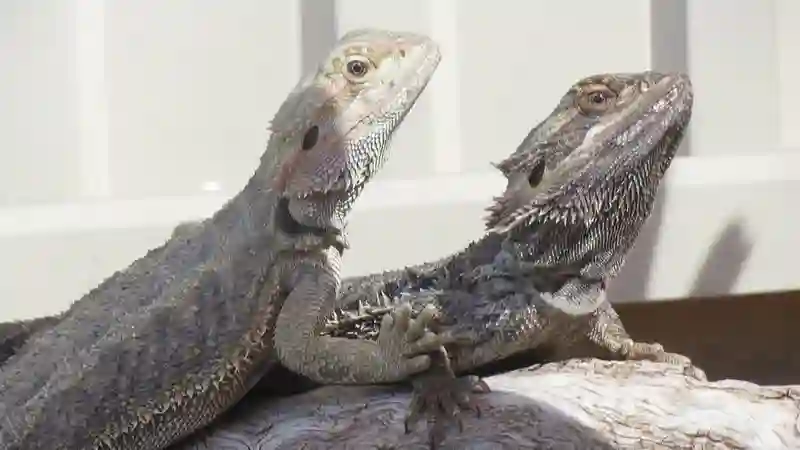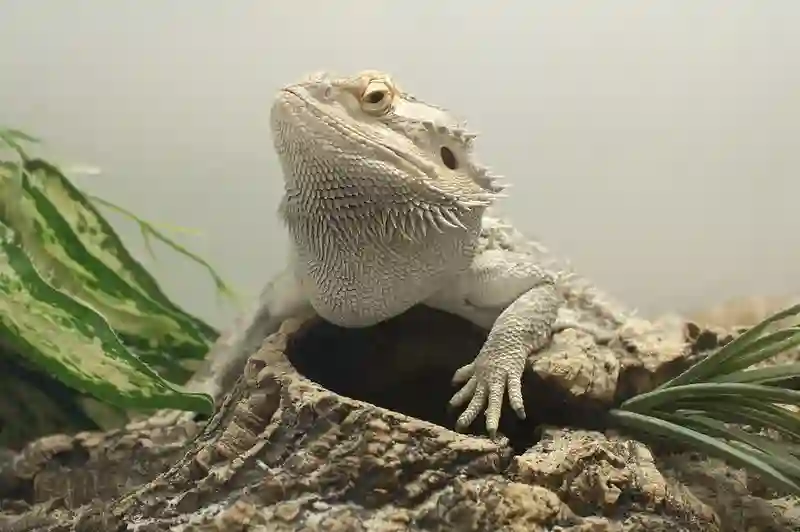Yes, bearded dragons can eat cicadas. Cicadas are safe and protein-packed insects that can be a nice treat for bearded dragons.
It is recommended to feed them fresh bugs rather than dead ones that have been sitting in the sun for a while.
It is important to make sure that the cicadas are pesticide and parasite-free and are an appropriate size for your bearded dragon.
Cicadas grow over an inch long, so it is important to consider their size before feeding them to your bearded dragon.
Some bearded dragon owners prefer to remove the wings before feeding cicadas to their pets due to the risk of impaction.
Nutritional Benefits Of Cicadas For Bearded Dragons

Cicadas are an excellent protein source for bearded dragons as they contain approximately 35% of crude protein.
This high amount of protein can help sustain the growth and development of bearded dragons, especially during their juvenile phase.
Cicadas have a low-fat content which makes them an ideal dietary supplement for reptiles that require less fat in their diet.
Apart from being a good protein source, cicadas also provide essential minerals such as calcium and phosphorus, which are crucial for the bone health and overall well-being of bearded dragons.
Cicadas also contain vitamins such as vitamins B2, B3, and B5 that help support metabolic functions in reptiles.
The tough exoskeleton of cicadas provides digestive benefits to bearded dragons by aiding in grinding down food during digestion.
Are There Any Risks Associated With Feeding Cicadas To Bearded Dragons?
As previously discussed, cicadas can provide various nutritional benefits to bearded dragons, including high protein content and calcium.
Cicadas may contain harmful toxins, particularly if they have been exposed to pesticides or other chemicals.
The seasonal availability of cicadas may make them an unreliable food source for bearded dragons.
If you choose to feed your pet cicadas, it is crucial to ensure that they are freshly caught in a safe and pesticide-free environment.
Size considerations should also be taken into account as larger cicadas may pose a choking hazard or lead to digestive issues in smaller bearded dragons.
As a result, alternative insects such as crickets or mealworms may be a safer and more consistent option for providing necessary nutrients to your pet lizard.
How Often Cicadas Should Be Offered To Bearded Dragons?
Cicadas are a great source of nutrition for bearded dragons, but it is not recommended to offer them frequently.
Bearded dragons should consume cicadas no more than once or twice a month, as part of a varied diet that includes other insects and vegetables.
Feeding them too often can lead to digestive issues, such as bloating and constipation.
Since cicadas have a hard exoskeleton that can be difficult to digest, they should be offered in moderation to avoid any health problems.
Offering bearded dragons a variety of food options is essential for their overall health and well-being.
How To Feed Them Cicadas?
Having established the importance of regulating cicada intake for bearded dragons, it is now relevant to explore how to feed them this insect safely.
Cicadas preparation is key in ensuring that these insects are free from any harmful substances, such as pesticides or chemicals, which can cause harm to your pet.
Before feeding cicadas to your bearded dragon, ensure that they are thoroughly washed and cooked to eliminate any potential health hazards.
Feeding frequency may also vary depending on the age and size of your bearded dragon.
As a rule of thumb, adult bearded dragons can consume insects once every other day while juveniles require more frequent feedings.
When feeding insects, it is important to offer recommended portion sizes based on the size and weight of your pet.
This ensures that they receive adequate nutrition without overfeeding or underfeeding them.
How To Store Cicadas Properly For Your Beardie?
Storing cicadas properly is crucial for ensuring that your bearded dragon receives the best nutrition possible from this food source.
One of the most important factors to consider when storing cicadas is temperature control.
Cicadas should be stored at a cool temperature, ideally between 40-45 degrees Fahrenheit, to prevent spoilage and maintain freshness.
Avoid storing them in direct sunlight or near sources of heat as this can cause them to dry out and lose their nutritional value.
Another factor to consider is humidity control.
Cicadas should be stored in a dry environment with low humidity levels to prevent mold growth and bacterial contamination.
It’s also essential to ensure proper airflow around the container where you store your cicadas.
Good ventilation will help prevent moisture buildup, which can lead to spoilage and foul odors.
To effectively store cicadas for your bearded dragon, here are some tips to follow:
- Choose an airtight container that provides ample space for the cicadas without overcrowding.
- Line the bottom of the container with paper towels or other absorbent material that can help absorb any excess moisture.
- Place the container in a cool, dry area away from direct sunlight.
- Check on your cicadas regularly and discard any that appear spoiled or discolored.
- Consider freezing extra cicadas for long-term storage if you have more than your bearded dragon can eat at once.
By following these guidelines, you’ll be able to store cicadas properly and provide your bearded dragon with a nutritious meal option that they’ll love.
